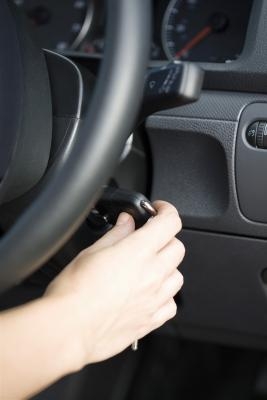
The starter is an electric motor that cranks your vehicle's engine when the key is turned in the ignition. This important component allows fuel to enter the cylinders to power your vehicle. A shorted starter can cause a variety of problems in a car; however, some of the symptoms and signs linked to a shorted starter can also relate to other mechanical issues. Ultimately, there are several things that can help you diagnose a shorted starter.
If your starter makes clicking or grinding sounds when you turn the key to crank the engine, it means you may have a shorted starter that has motor problems, or a gear is possibly stuck in the starter. The sounds originate from under your hood and are easy to hear because the engine won't turn over. However, if the engine does turn over but fails to start, or if you hear multiple clicks until the key is released, the problem may be a bad alternator, faulty battery connections or a choke that is defective or not adjusted properly.
A shorted starter can be the problem when your vehicle's engine fails to crank upon turning the key in the ignition. This happens because the shorted starter is unable to use the power originating from your car's battery, which is what the starter motor needs to turn the engine. If your vehicle's engine cranks so slowly that it isn't able to start, you may have a shorted starter. Keep in mind that a weak battery may also be the reason why your vehicle is not starting.
If you don't get any sound from your engine when trying to start it, but the lights and the windshield wipers are working, you may have a shorted starter with a faulty solenoid, which is the mechanical device on top of your starter motor's housing. Occasionally, this can be fixed by jiggling the key inside the ignition while turning it.
A burnt smell or smoke coming from the starter motor under the hood is a sign of a shorted starter. This indicates there are electrical problems with the starter's wires and the connections within the starter motor. Any type of problem with the wires that connect to the starter solenoid can cause a short that ultimately creates a burnt smell or smoke.
Many auto parts stores test starters at no charge if they're removed and brought it. However, if you aren't sure how to remove the starter from your vehicle, it's best to let a professional handle this task. Ultimately, if you have one or more of the aforementioned signs or symptoms, you should take your car to a repair shop.